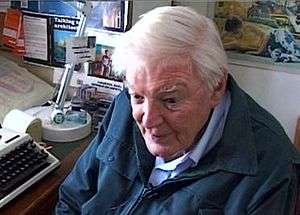Colin Ward

Colin Ward (14 August 1924 – 11 February 2010) was a British anarchist writer. He has been called "one of the greatest anarchist thinkers of the past half century, and a pioneering social historian." [1]
Life
Ward was born in Wanstead, Essex. He became an anarchist while in the British Army during World War II. As a subscriber to War Commentary, the war-time equivalent of Freedom, he was called in 1945 from Orkney, where he was serving, to give evidence at the London trial of the editors for publishing an article allegedly intended to seduce soldiers from their duty or allegiance. Ward robustly repudiated any seduction, but the three editors (Philip Sansom, Vernon Richards and John Hewetson) were convicted and sentenced to nine months imprisonment.
He was an editor of the British anarchist newspaper Freedom from 1947 to 1960, and the founder and editor of the monthly anarchist journal Anarchy from 1961 to 1970.[2]
From 1952 to 1961, Ward worked as an architect. In 1971, he became the Education Officer for the Town and Country Planning Association. He published widely on education, architecture and town planning. His most influential book was The Child In The City (1978), about children's street culture. From 1995-6, Ward was Centennial Professor of Housing and Social Policy at the London School of Economics.[3]
In 2001, Ward was made an Honorary Doctor of Philosophy at Anglia Ruskin University.[4]
Thought
Anarchism
Ward's philosophy aimed at removing authoritarian forms of social organisation and replacing them with self-managed, non-hierarchical forms. This is based upon the principle that, as Ward put it, "in small face-to-face groups, the bureaucratising and hierarchical tendencies inherent in organisations have least opportunity to develop".[5] He particularly admired the Swiss system of direct democracy and cantons whereby each canton is run by its members who have control on the laws placed upon them, although he disapproved of many the policies this system enacted.
"I believe that the social ideas of anarchism: autonomous groups, spontaneous order, workers’ control, the federative principle, add up to a coherent theory of social organisation which is a valid and realistic alternative to the authoritarian, hierarchical and institutional social philosophy which we see in application all around us. Man will be compelled, Kropotkin declared, ‘to find new forms of organisation for the social functions which the State fulfils through the bureaucracy’ and he insisted that ‘as long as this is not done nothing will be done. I think we have discovered what these new forms of organisation should be. We have now to make the opportunities for putting them into practice".
Urban issues
Most of Ward's works deal with the issue of rural housing and the problems of overpopulation and planning regulations in Britain to which he proposed anarchistic solutions. He was a keen admirer of architect Walter Segal who set up a ‘build it yourself’ system in Lewisham meaning that land that was too small or difficult to build on conventionally was given to people who with Segal's help would build their own homes. Ward was very keen on the idea of ‘build it yourself’ having said in response to the proposition of removing all planning laws, ‘I don't believe in just letting it rip, the rich get away with murder when that happens. But I do want the planning system to be flexible enough to give homeless people a chance’. In his book Cotters and Squatters, Ward described the historical development of informal customs to appropriate land for housing which frequently grew up in opposition to legally constituted systems of land ownership. Ward described folkways in many cultures which parallel the Welsh tradition of the Tŷ unnos or 'one night house' erected on common land.
Ward included a passage from one of his anarchist forebears, Peter Kropotkin, who said of the empty and overgrown landscape of Surrey and Sussex at the end of the 19th century, ‘in every direction I see abandoned cottages and orchards going to ruin, a whole population has disappeared.’ Ward himself went on to observe: ‘Precisely a century after this account was written, the fields were empty again. Fifty years of subsidies had made the owners of arable land millionaires through mechanised cultivation and, with a crisis of over-production; the European Community was rewarding them for growing no crops on part of their land. However, opportunities for the homeless poor were fewer than ever in history. The grown-up children of local families can’t get on the housing ladder’. Wards solution was that ‘there should be some place in every parish where it's possible for people to build their own homes, and they should be allowed to do it a bit at a time, starting in a simple way and improving the structure as they go along. The idea that a house should be completed in one go before you can get planning permission and a mortgage is ridiculous. Look at the houses in this village. Many of them have developed their character over centuries - a bit of medieval at the back, with Tudor and Georgian add-ons.’
Education
Colin Ward in his main theoretical publication Anarchy in Action (1973) in a chapter called "Schools No Longer" "discusses the genealogy of education and schooling, in particular examining the writings of Everett Reimer and Ivan Illich, and the beliefs of anarchist educator Paul Goodman. Many of Colin’s writings in the 1970s, in particular Streetwork: The Exploding School (1973, with Anthony Fyson), focused on learning practices and spaces outside of the school building. In introducing Streetwork, Ward writes, “[this] is a book about ideas: ideas of the environment as the educational resource, ideas of the enquiring school, the school without walls...”. In the same year, Ward contributed to Education Without Schools (edited by Peter Buckman) discussing ‘the role of the state’. He argued that “one significant role of the state in the national education systems of the world is to perpetuate social and economic injustice”".[6]
In The Child in the City (1978), and later The Child in the Country (1988), Ward "examined the everyday spaces of young people’s lives and how they can negotiate and re-articulate the various environments they inhabit. In his earlier text, the more famous of the two, Colin Ward explores the creativity and uniqueness of children and how they cultivate ‘the art of making the city work’. He argued that through play, appropriation and imagination, children can counter adult-based intentions and interpretations of the built environment. His later text, The Child in the Country, inspired a number of social scientists, notably geographer Chris Philo (1992), to call for more attention to be paid to young people as a ‘hidden’ and marginalised group in society."[6]
Bibliography
- Talking Green (2012)
- Autonomy, Solidarity, Possibility: The Colin Ward Reader (edited by Damian F. White and Chris Wilbert) (2011)
- Anarchism: A Very Short Introduction (2004)
- Cotters and Squatters: The Hidden History of Housing (2004)
- Talking Anarchy (with David Goodway) (2003)
- Sociable Cities: The Legacy of Ebenezer Howard (with Peter Hall) (1999)
- Reflected in Water: a Crisis of Social Responsibility (1997)
- Havens and Springboards: The Foyer Movement in Context (1997)
- Stamps: Designs For Anarchist Postage Stamps (illustrated by Clifford Harper) (1997)
- Talking to Architects (1996)
- New Town, Home Town (1993)
- Freedom to Go: After the Motor Age (1991)
- Influences: Voices of Creative Dissent (1991)
- Talking Houses: 10 Lectures (1990)
- Undermining the Central Line (with Ruth Rendell) (1989)
- Welcome, Thinner City: Urban Survival in the 1990s (1989)
- The Allotment: Its Landscape and Culture (with David Crouch) (1988)
- The Child in the Country (1988)
- A Decade of Anarchy (1961-1970) (1987)
- Chartres: the Making of a Miracle (1986)
- Goodnight Campers! The History of the British Holiday Camp (with Dennis Hardy) (1986)
- When We Build Again: Let's Have Housing that Works! (1985)
- Arcadia for All: The Legacy of a Makeshift Landscape (with Dennis Hardy) (1984)
- The Child In The City (1978)
- Housing: An Anarchist Approach (1976)
- British School Buildings: Designs and Appraisals 1964-74 (1976)
- Tenants Take Over (1974)
- Utopia (1974)
- Vandalism (ed.) (1974)
- Anarchy in Action (1973)
- Streetwork: The Exploding School (with Anthony Fyson) (1973)
- Work (1972)
Critical work on Colin Ward
- Wilbert, Chris, and Damian F. White. Autonomy, solidarity, possibility: the Colin Ward reader. AK Press, 2011.
- Levy, Carl. Colin Ward:: Life, Times and Thought. Lawrence & Wishart, 2013.
- Remembering Colin Ward (Five Leaves Press 2011)
- Richer Futures. Fashioning A New Politics (Earthscan, 1999)
- Goodway, David. Anarchist Seeds Beneath the Snow: Left-libertarian Thought and British Writers from William Morris to Colin Ward. PM Press, 2012.
- Honeywell, Carissa. A British Anarchist Tradition: Herbert Read, Alex Comfort and Colin Ward. A&C Black, 2011.
- Levy, Carl. "Introduction: Colin Ward (1924-2010)." Anarchist Studies 19.2 (2011): 7-16.
- Goodway, David. "Colin Ward and the New Left." Anarchist Studies 19.2 (2011): 42-56.
- White, Stuart. "Social anarchism, lifestyle anarchism, and the anarchism of Colin Ward." Anarchist Studies 19.2 (2011): 92-104.
- White, Stuart. "Making anarchism respectable? The social philosophy of Colin Ward." Journal of Political Ideologies, 12:1 (2007): 11-28, DOI: 10.1080/13569310601095580
See also
References
- ↑ Krznaric, Roman (27 February 2010). "Colin Ward – an obituary and appreciation of the chuckling anarchist". outrospection.org.
- ↑ "Anglia Ruskin University". anglia.ac.uk.
- ↑ "The Times & The Sunday Times". thetimes.co.uk.
- ↑ "Anglia Ruskin University, profile". anglia.ac.uk.
- ↑ « in small face-to-face groups, the bureaucratising and hierarchical tendencies inherent in organisations have least opportunity to develop », Colin Ward, Anarchism as a Theory of Organization, 1966, "Archived copy". Archived from the original on 25 March 2010. Retrieved 1 March 2010. .
- 1 2 Mills, S. (2010) 'Colin Ward: The ‘Gentle’ Anarchist and Informal Education’ at the encyclopaedia of informal education.
Further reading
- Goodway, David (2013). "The Anarchism of Colin Ward". In Worpole, Ken. Richer Futures: Fashioning a New Politics. Routledge. pp. 3–20. ISBN 978-1-134-06078-8.
External links
- Colin Ward archive at The Anarchist Library
- Colin Ward, Anarchism as a Theory of Organization (1966)
- Colin Ward, Harmony through Complexity (1973)
- Daily Telegraph obituary, 29 March 2010
- Guardian obituary, 22 February 2010
- The Good Life of a Gentle Anarchist, Boyd Tonkin, The Independent, 19 February 2010
- Colin Ward, Pioneer of Mutualism
- Obituary at Outrospection.org
- Autonomy, Solidarity, Possibility: The Colin Ward Reader
- Center for a Stateless Society on Ward
- Ward and Five Leaves publishers
- Ward and the Essex plotlanders, Guardian, 7 March 2010
- Inveterate anarchist with a plan to put roofs over the rural poor, Guardian, 10 July 2002
- Colin Ward interview by David Goodway
- A friendly right-wing view of Colin Ward, by the editor of Reason, 'the magazine of free minds and free markets'
- Anarchy in the UK? It could be the best government we’ve had, Boyd Tonkin, The Independent, 03 April 2015
